Australian Securities and Investments Commission v Healey Case Report
VerifiedAdded on 2023/05/23
|12
|1811
|259
Report
AI Summary
This report provides a detailed analysis of the Australian Securities and Investments Commission v Healey [2011] FCA 717 case, focusing on the breaches of director duties under the Corporations Act 2001. The case involved seven directors and the CFO of the Centro Retail Group who were found to have breached their duties. The report examines the duties breached, including the duty of care and diligence under section 180(1), and the failure to ensure compliance with financial reporting obligations. Justice Middleton's findings emphasized the importance of directors actively reviewing financial statements and understanding the company's affairs, rather than relying solely on management and auditors. The analysis explores the court's decision, highlighting the directors' responsibilities, the consequences of their actions, and the implications for corporate governance in Australia. The report also includes the relevance of the decision and its impact on director's responsibilities. This case underscores the need for directors to be proactive in their roles and to exercise due diligence in overseeing company operations and financial reporting. The report concludes with a summary of the key findings and implications of the case.

AUSTRALIAN SECURITIES AND
INVESTMENTS COMMISSION V
HEALEY [2011] FCA 717
(Student Details: )
Business and Corporation Law
INVESTMENTS COMMISSION V
HEALEY [2011] FCA 717
(Student Details: )
Business and Corporation Law
Paraphrase This Document
Need a fresh take? Get an instant paraphrase of this document with our AI Paraphraser
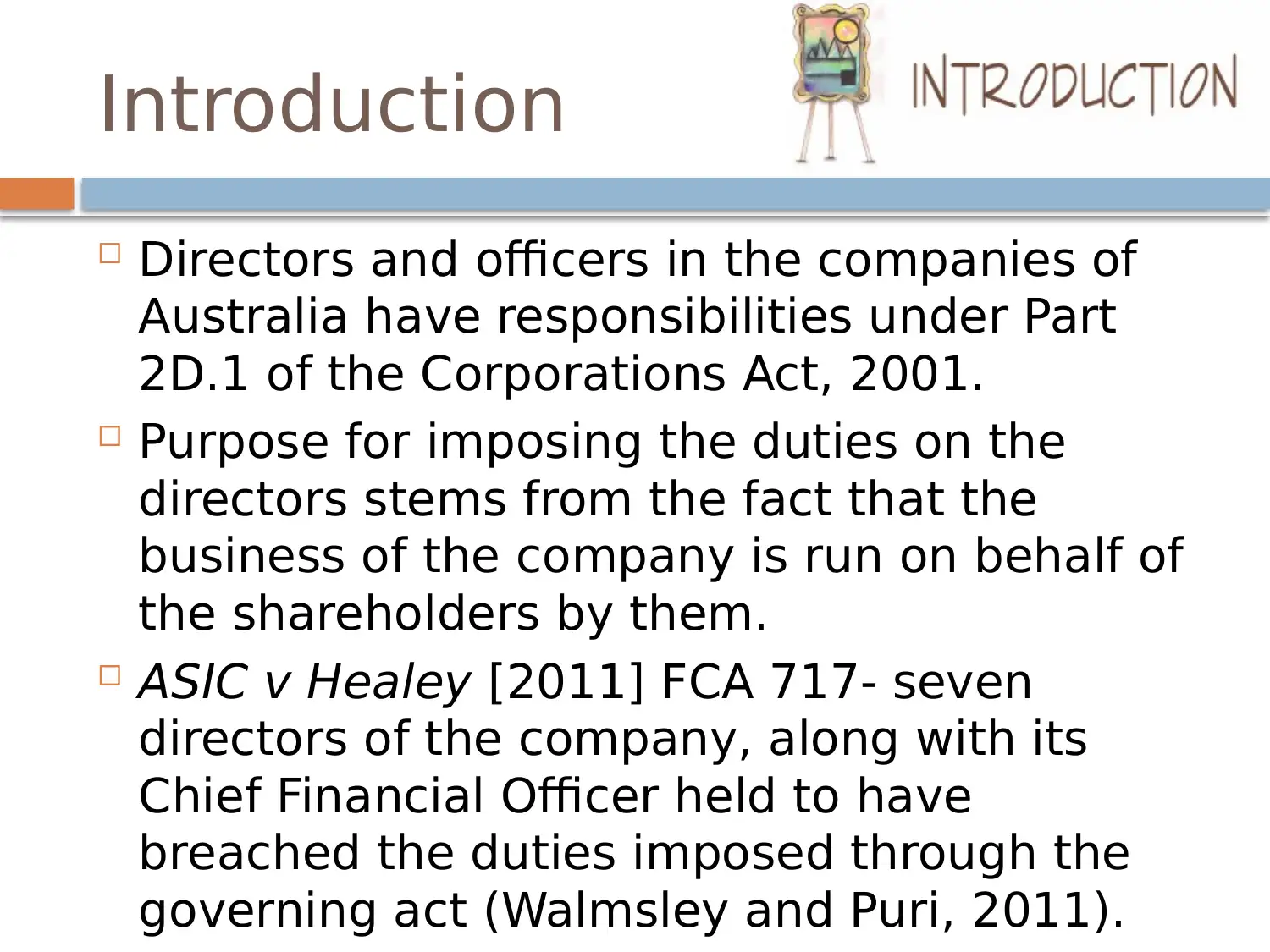
Introduction
Directors and officers in the companies of
Australia have responsibilities under Part
2D.1 of the Corporations Act, 2001.
Purpose for imposing the duties on the
directors stems from the fact that the
business of the company is run on behalf of
the shareholders by them.
ASIC v Healey [2011] FCA 717- seven
directors of the company, along with its
Chief Financial Officer held to have
breached the duties imposed through the
governing act (Walmsley and Puri, 2011).
Directors and officers in the companies of
Australia have responsibilities under Part
2D.1 of the Corporations Act, 2001.
Purpose for imposing the duties on the
directors stems from the fact that the
business of the company is run on behalf of
the shareholders by them.
ASIC v Healey [2011] FCA 717- seven
directors of the company, along with its
Chief Financial Officer held to have
breached the duties imposed through the
governing act (Walmsley and Puri, 2011).
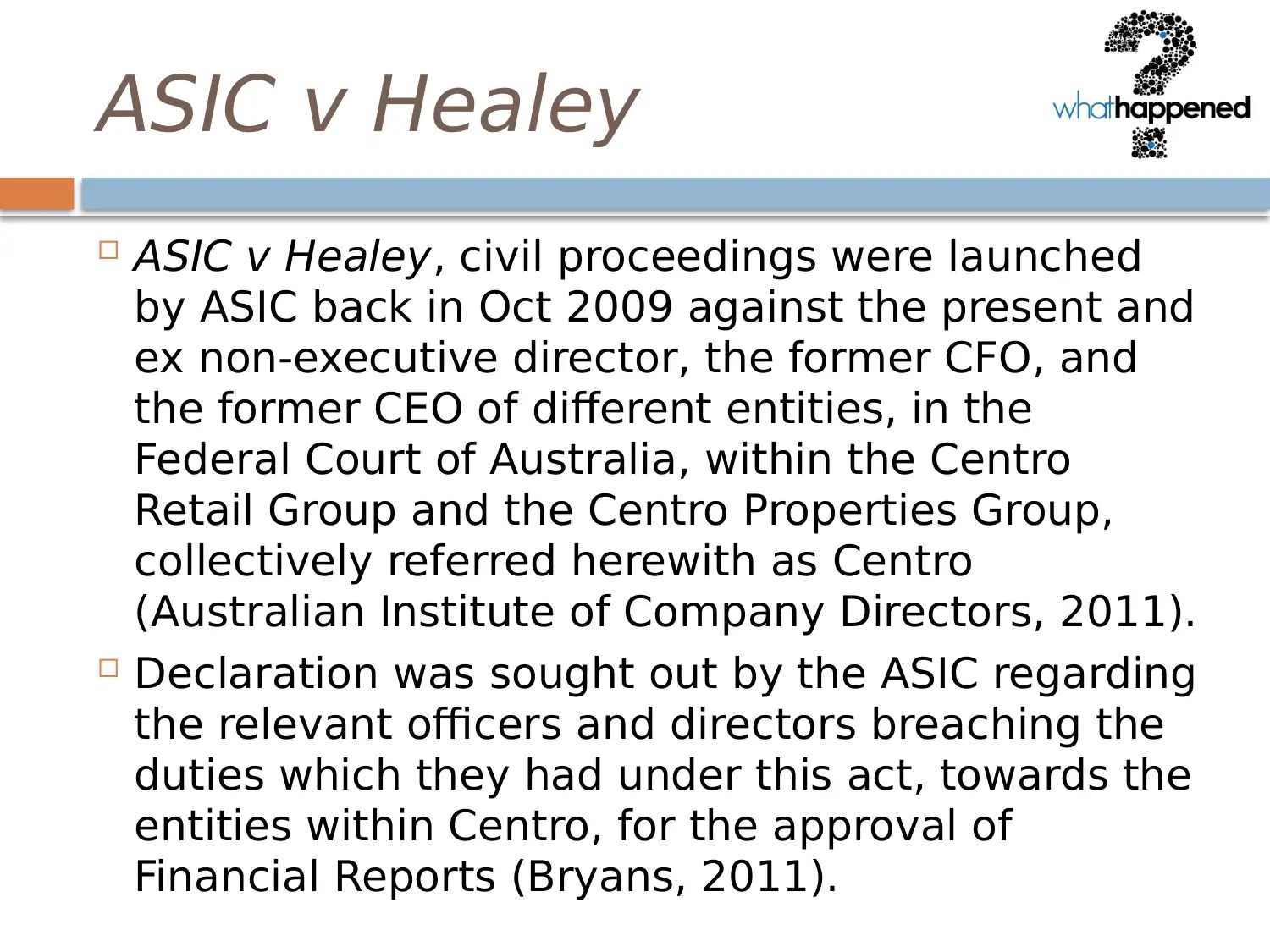
ASIC v Healey
ASIC v Healey, civil proceedings were launched
by ASIC back in Oct 2009 against the present and
ex non-executive director, the former CFO, and
the former CEO of different entities, in the
Federal Court of Australia, within the Centro
Retail Group and the Centro Properties Group,
collectively referred herewith as Centro
(Australian Institute of Company Directors, 2011).
Declaration was sought out by the ASIC regarding
the relevant officers and directors breaching the
duties which they had under this act, towards the
entities within Centro, for the approval of
Financial Reports (Bryans, 2011).
ASIC v Healey, civil proceedings were launched
by ASIC back in Oct 2009 against the present and
ex non-executive director, the former CFO, and
the former CEO of different entities, in the
Federal Court of Australia, within the Centro
Retail Group and the Centro Properties Group,
collectively referred herewith as Centro
(Australian Institute of Company Directors, 2011).
Declaration was sought out by the ASIC regarding
the relevant officers and directors breaching the
duties which they had under this act, towards the
entities within Centro, for the approval of
Financial Reports (Bryans, 2011).
⊘ This is a preview!⊘
Do you want full access?
Subscribe today to unlock all pages.

Trusted by 1+ million students worldwide
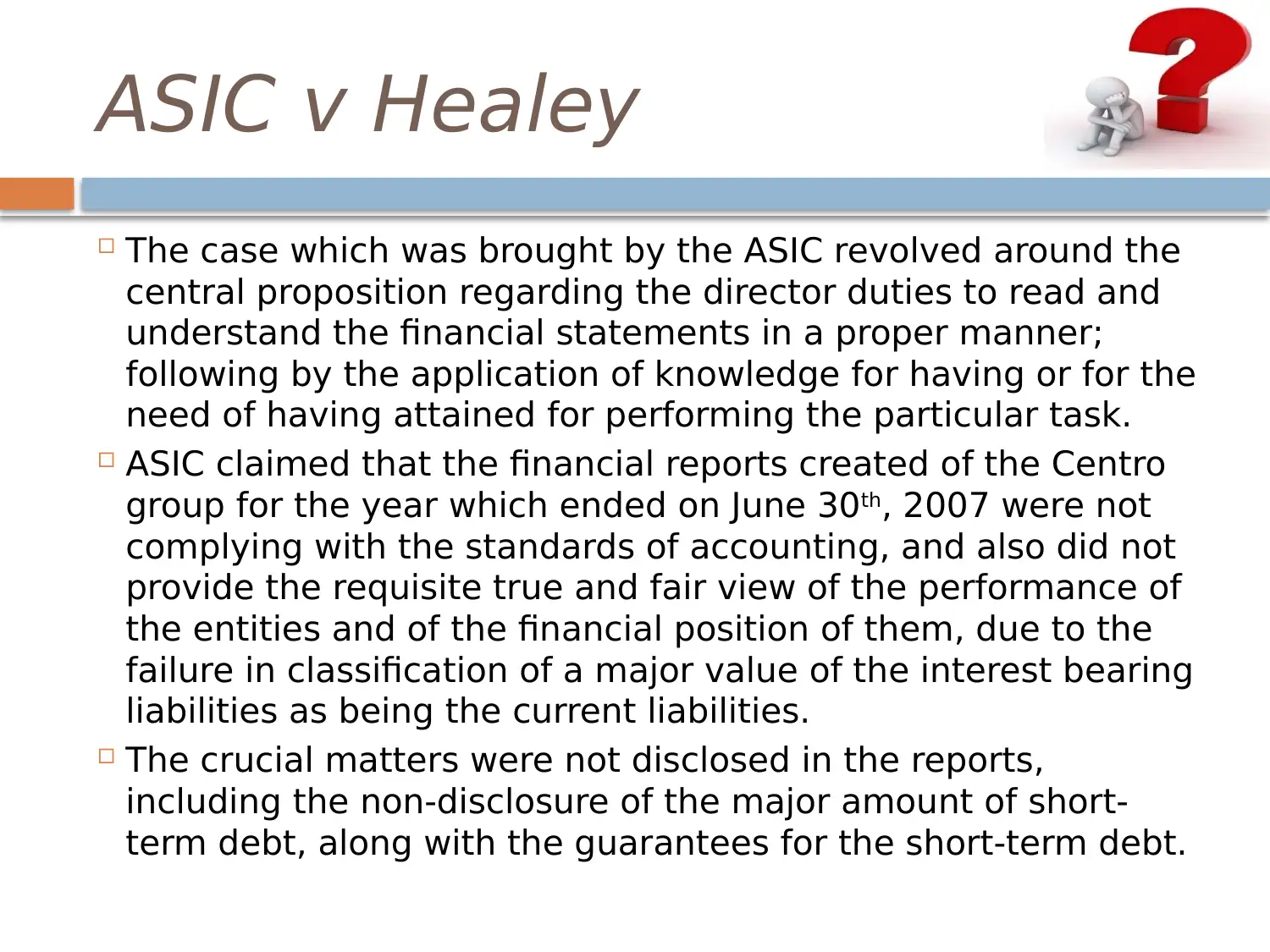
ASIC v Healey
The case which was brought by the ASIC revolved around the
central proposition regarding the director duties to read and
understand the financial statements in a proper manner;
following by the application of knowledge for having or for the
need of having attained for performing the particular task.
ASIC claimed that the financial reports created of the Centro
group for the year which ended on June 30th, 2007 were not
complying with the standards of accounting, and also did not
provide the requisite true and fair view of the performance of
the entities and of the financial position of them, due to the
failure in classification of a major value of the interest bearing
liabilities as being the current liabilities.
The crucial matters were not disclosed in the reports,
including the non-disclosure of the major amount of short-
term debt, along with the guarantees for the short-term debt.
The case which was brought by the ASIC revolved around the
central proposition regarding the director duties to read and
understand the financial statements in a proper manner;
following by the application of knowledge for having or for the
need of having attained for performing the particular task.
ASIC claimed that the financial reports created of the Centro
group for the year which ended on June 30th, 2007 were not
complying with the standards of accounting, and also did not
provide the requisite true and fair view of the performance of
the entities and of the financial position of them, due to the
failure in classification of a major value of the interest bearing
liabilities as being the current liabilities.
The crucial matters were not disclosed in the reports,
including the non-disclosure of the major amount of short-
term debt, along with the guarantees for the short-term debt.
Paraphrase This Document
Need a fresh take? Get an instant paraphrase of this document with our AI Paraphraser
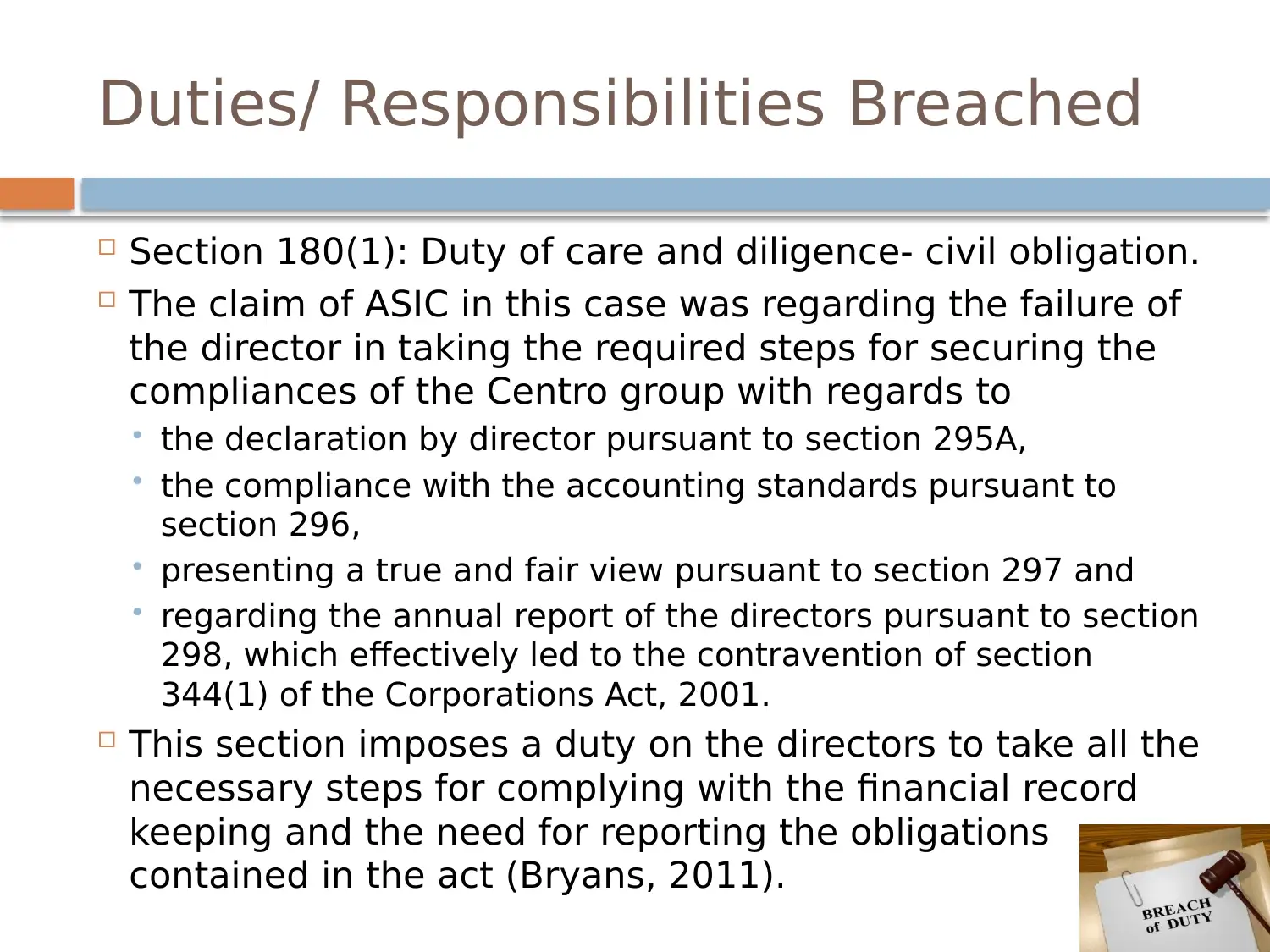
Duties/ Responsibilities Breached
Section 180(1): Duty of care and diligence- civil obligation.
The claim of ASIC in this case was regarding the failure of
the director in taking the required steps for securing the
compliances of the Centro group with regards to
the declaration by director pursuant to section 295A,
the compliance with the accounting standards pursuant to
section 296,
presenting a true and fair view pursuant to section 297 and
regarding the annual report of the directors pursuant to section
298, which effectively led to the contravention of section
344(1) of the Corporations Act, 2001.
This section imposes a duty on the directors to take all the
necessary steps for complying with the financial record
keeping and the need for reporting the obligations
contained in the act (Bryans, 2011).
Section 180(1): Duty of care and diligence- civil obligation.
The claim of ASIC in this case was regarding the failure of
the director in taking the required steps for securing the
compliances of the Centro group with regards to
the declaration by director pursuant to section 295A,
the compliance with the accounting standards pursuant to
section 296,
presenting a true and fair view pursuant to section 297 and
regarding the annual report of the directors pursuant to section
298, which effectively led to the contravention of section
344(1) of the Corporations Act, 2001.
This section imposes a duty on the directors to take all the
necessary steps for complying with the financial record
keeping and the need for reporting the obligations
contained in the act (Bryans, 2011).
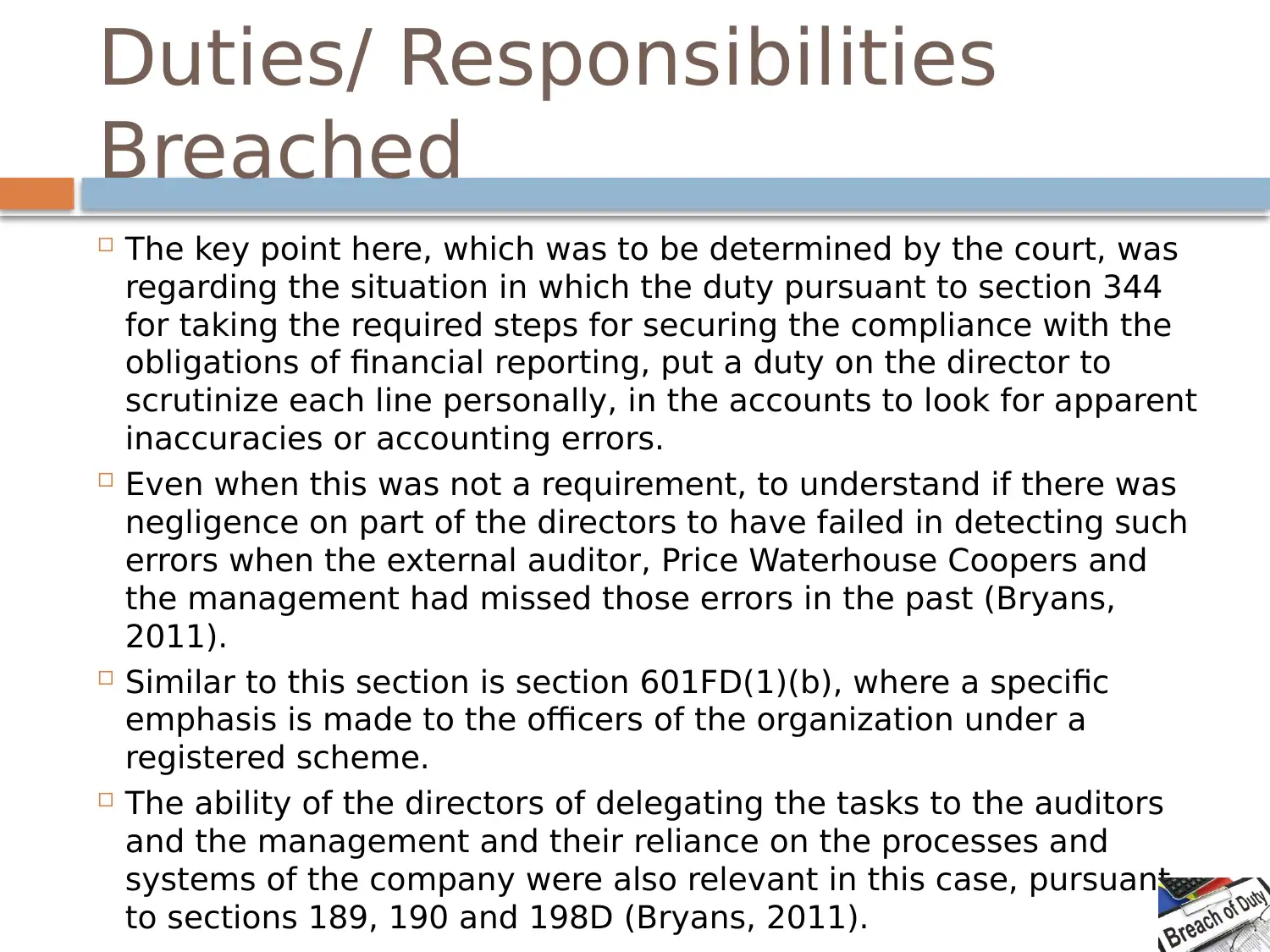
Duties/ Responsibilities
Breached
The key point here, which was to be determined by the court, was
regarding the situation in which the duty pursuant to section 344
for taking the required steps for securing the compliance with the
obligations of financial reporting, put a duty on the director to
scrutinize each line personally, in the accounts to look for apparent
inaccuracies or accounting errors.
Even when this was not a requirement, to understand if there was
negligence on part of the directors to have failed in detecting such
errors when the external auditor, Price Waterhouse Coopers and
the management had missed those errors in the past (Bryans,
2011).
Similar to this section is section 601FD(1)(b), where a specific
emphasis is made to the officers of the organization under a
registered scheme.
The ability of the directors of delegating the tasks to the auditors
and the management and their reliance on the processes and
systems of the company were also relevant in this case, pursuant
to sections 189, 190 and 198D (Bryans, 2011).
Breached
The key point here, which was to be determined by the court, was
regarding the situation in which the duty pursuant to section 344
for taking the required steps for securing the compliance with the
obligations of financial reporting, put a duty on the director to
scrutinize each line personally, in the accounts to look for apparent
inaccuracies or accounting errors.
Even when this was not a requirement, to understand if there was
negligence on part of the directors to have failed in detecting such
errors when the external auditor, Price Waterhouse Coopers and
the management had missed those errors in the past (Bryans,
2011).
Similar to this section is section 601FD(1)(b), where a specific
emphasis is made to the officers of the organization under a
registered scheme.
The ability of the directors of delegating the tasks to the auditors
and the management and their reliance on the processes and
systems of the company were also relevant in this case, pursuant
to sections 189, 190 and 198D (Bryans, 2011).
⊘ This is a preview!⊘
Do you want full access?
Subscribe today to unlock all pages.

Trusted by 1+ million students worldwide
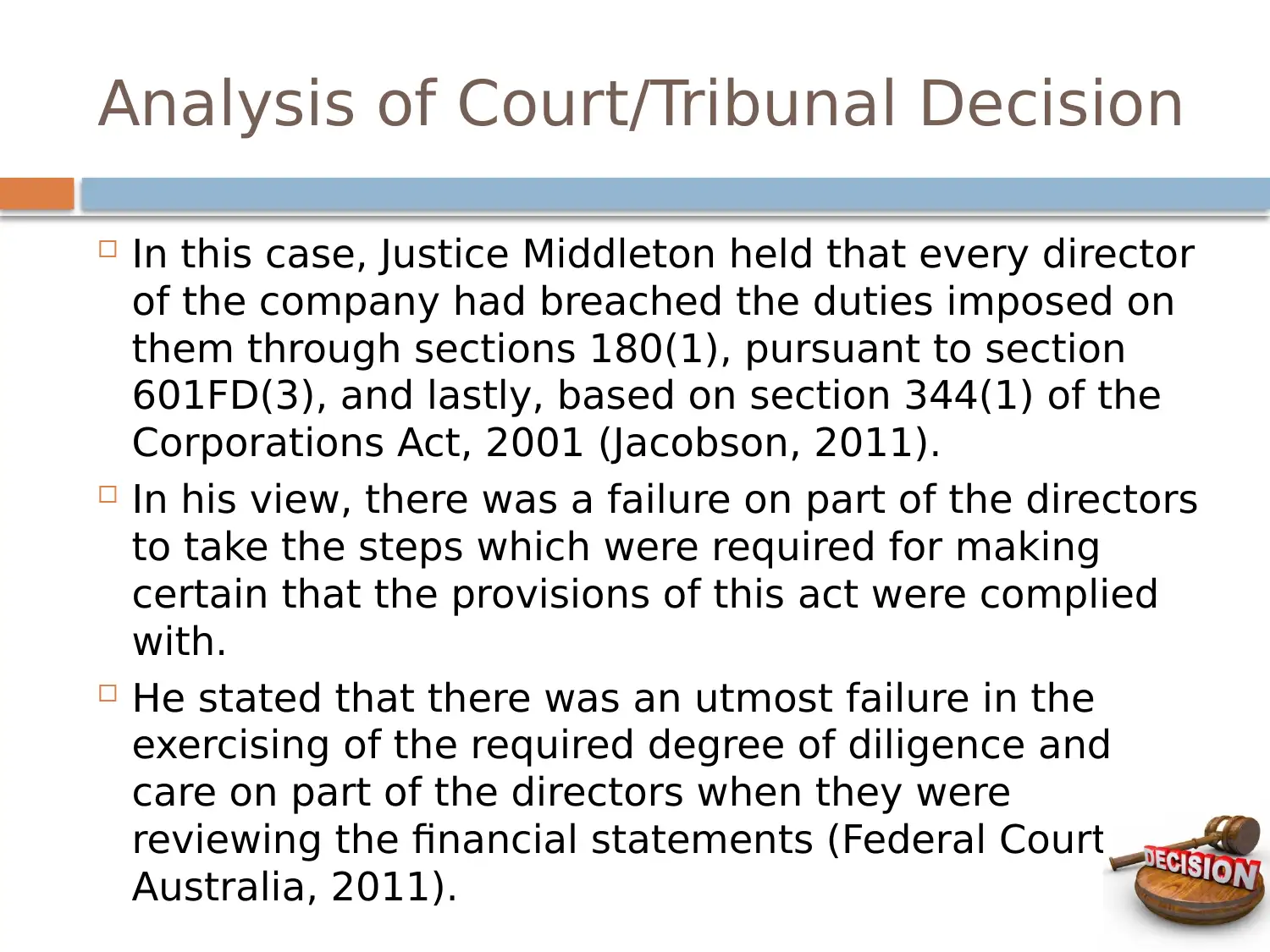
Analysis of Court/Tribunal Decision
In this case, Justice Middleton held that every director
of the company had breached the duties imposed on
them through sections 180(1), pursuant to section
601FD(3), and lastly, based on section 344(1) of the
Corporations Act, 2001 (Jacobson, 2011).
In his view, there was a failure on part of the directors
to take the steps which were required for making
certain that the provisions of this act were complied
with.
He stated that there was an utmost failure in the
exercising of the required degree of diligence and
care on part of the directors when they were
reviewing the financial statements (Federal Court of
Australia, 2011).
In this case, Justice Middleton held that every director
of the company had breached the duties imposed on
them through sections 180(1), pursuant to section
601FD(3), and lastly, based on section 344(1) of the
Corporations Act, 2001 (Jacobson, 2011).
In his view, there was a failure on part of the directors
to take the steps which were required for making
certain that the provisions of this act were complied
with.
He stated that there was an utmost failure in the
exercising of the required degree of diligence and
care on part of the directors when they were
reviewing the financial statements (Federal Court of
Australia, 2011).
Paraphrase This Document
Need a fresh take? Get an instant paraphrase of this document with our AI Paraphraser
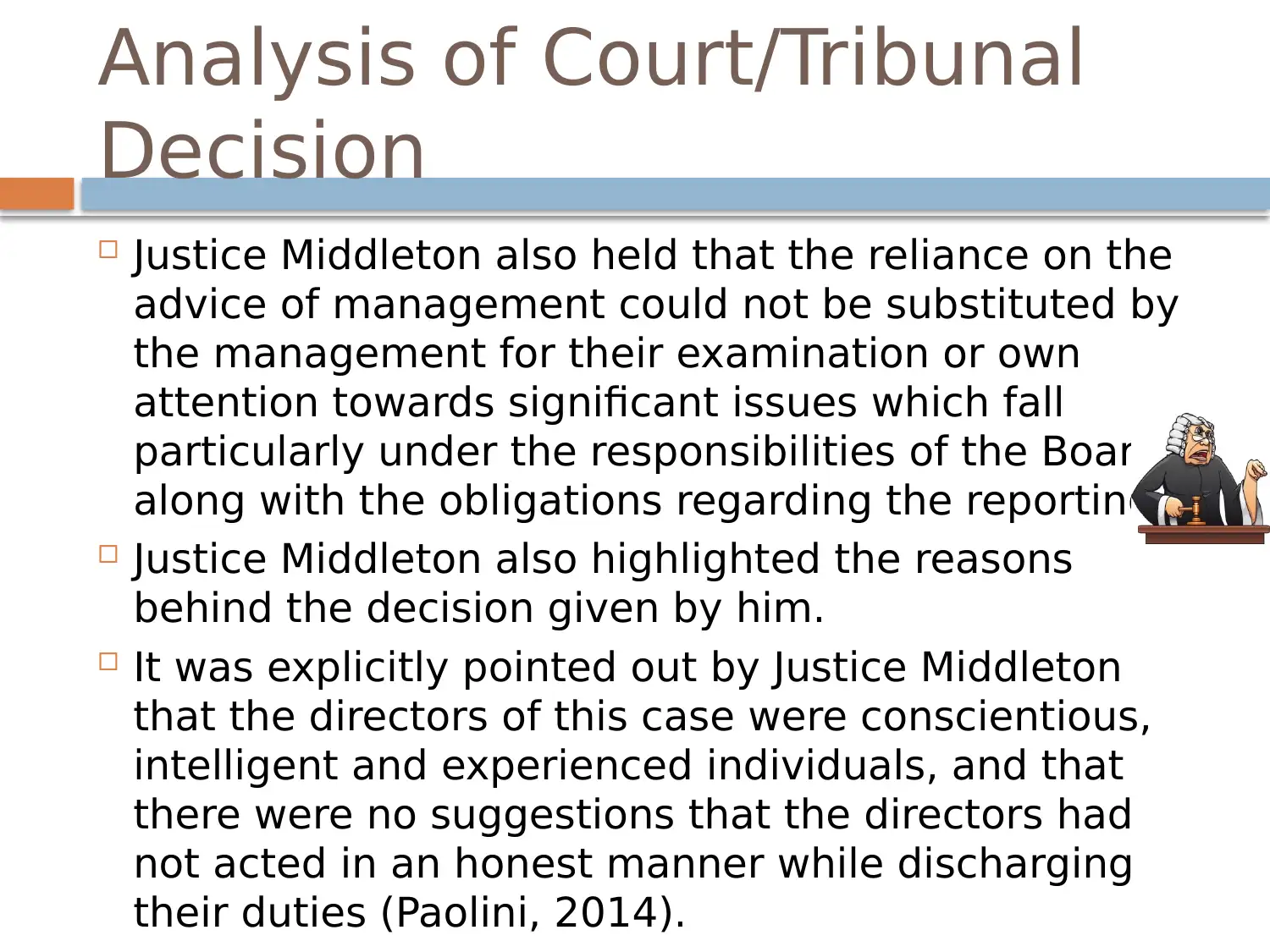
Analysis of Court/Tribunal
Decision
Justice Middleton also held that the reliance on the
advice of management could not be substituted by
the management for their examination or own
attention towards significant issues which fall
particularly under the responsibilities of the Board,
along with the obligations regarding the reporting.
Justice Middleton also highlighted the reasons
behind the decision given by him.
It was explicitly pointed out by Justice Middleton
that the directors of this case were conscientious,
intelligent and experienced individuals, and that
there were no suggestions that the directors had
not acted in an honest manner while discharging
their duties (Paolini, 2014).
Decision
Justice Middleton also held that the reliance on the
advice of management could not be substituted by
the management for their examination or own
attention towards significant issues which fall
particularly under the responsibilities of the Board,
along with the obligations regarding the reporting.
Justice Middleton also highlighted the reasons
behind the decision given by him.
It was explicitly pointed out by Justice Middleton
that the directors of this case were conscientious,
intelligent and experienced individuals, and that
there were no suggestions that the directors had
not acted in an honest manner while discharging
their duties (Paolini, 2014).
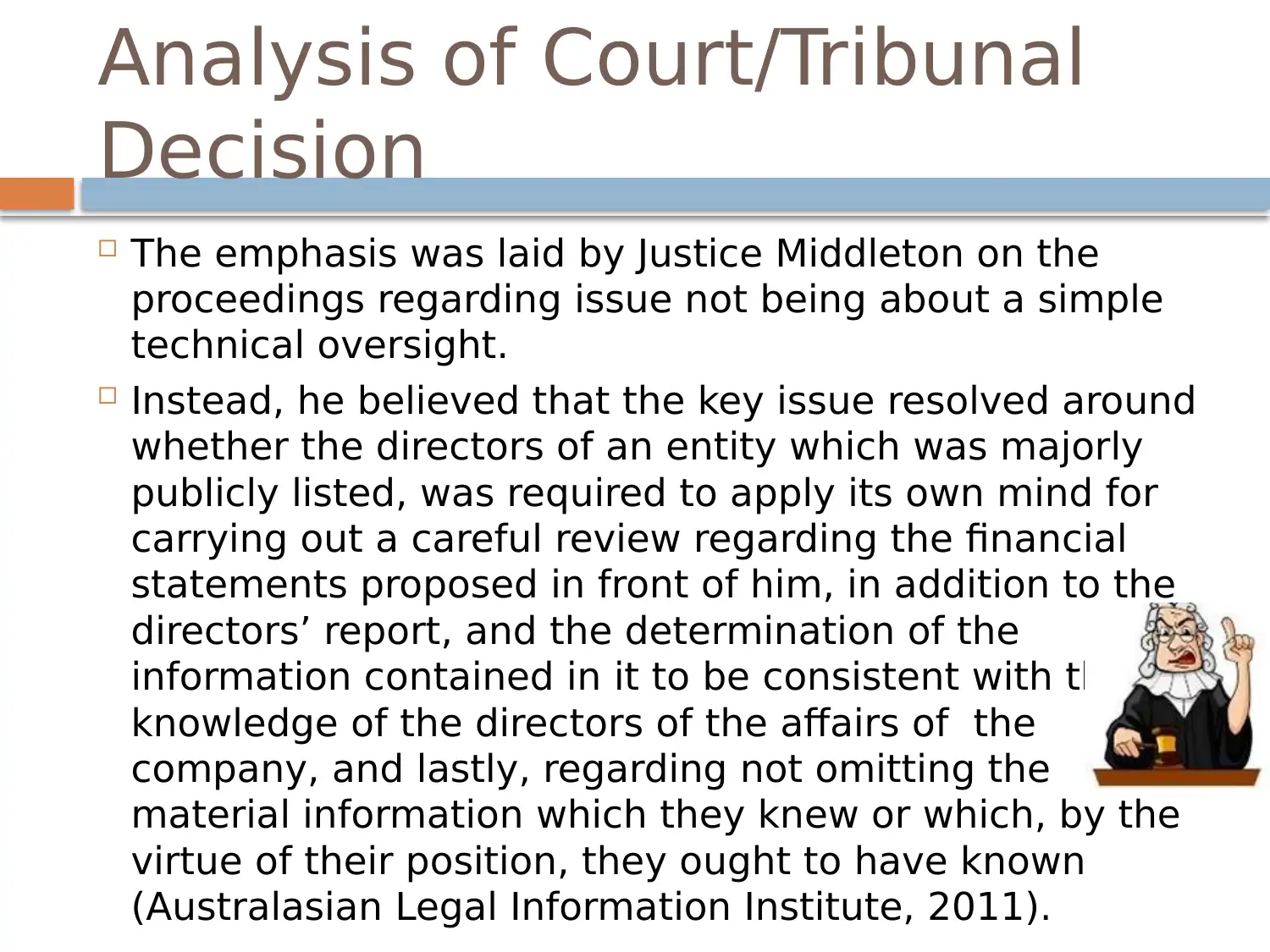
Analysis of Court/Tribunal
Decision
The emphasis was laid by Justice Middleton on the
proceedings regarding issue not being about a simple
technical oversight.
Instead, he believed that the key issue resolved around
whether the directors of an entity which was majorly
publicly listed, was required to apply its own mind for
carrying out a careful review regarding the financial
statements proposed in front of him, in addition to the
directors’ report, and the determination of the
information contained in it to be consistent with the
knowledge of the directors of the affairs of the
company, and lastly, regarding not omitting the
material information which they knew or which, by the
virtue of their position, they ought to have known
(Australasian Legal Information Institute, 2011).
Decision
The emphasis was laid by Justice Middleton on the
proceedings regarding issue not being about a simple
technical oversight.
Instead, he believed that the key issue resolved around
whether the directors of an entity which was majorly
publicly listed, was required to apply its own mind for
carrying out a careful review regarding the financial
statements proposed in front of him, in addition to the
directors’ report, and the determination of the
information contained in it to be consistent with the
knowledge of the directors of the affairs of the
company, and lastly, regarding not omitting the
material information which they knew or which, by the
virtue of their position, they ought to have known
(Australasian Legal Information Institute, 2011).
⊘ This is a preview!⊘
Do you want full access?
Subscribe today to unlock all pages.

Trusted by 1+ million students worldwide
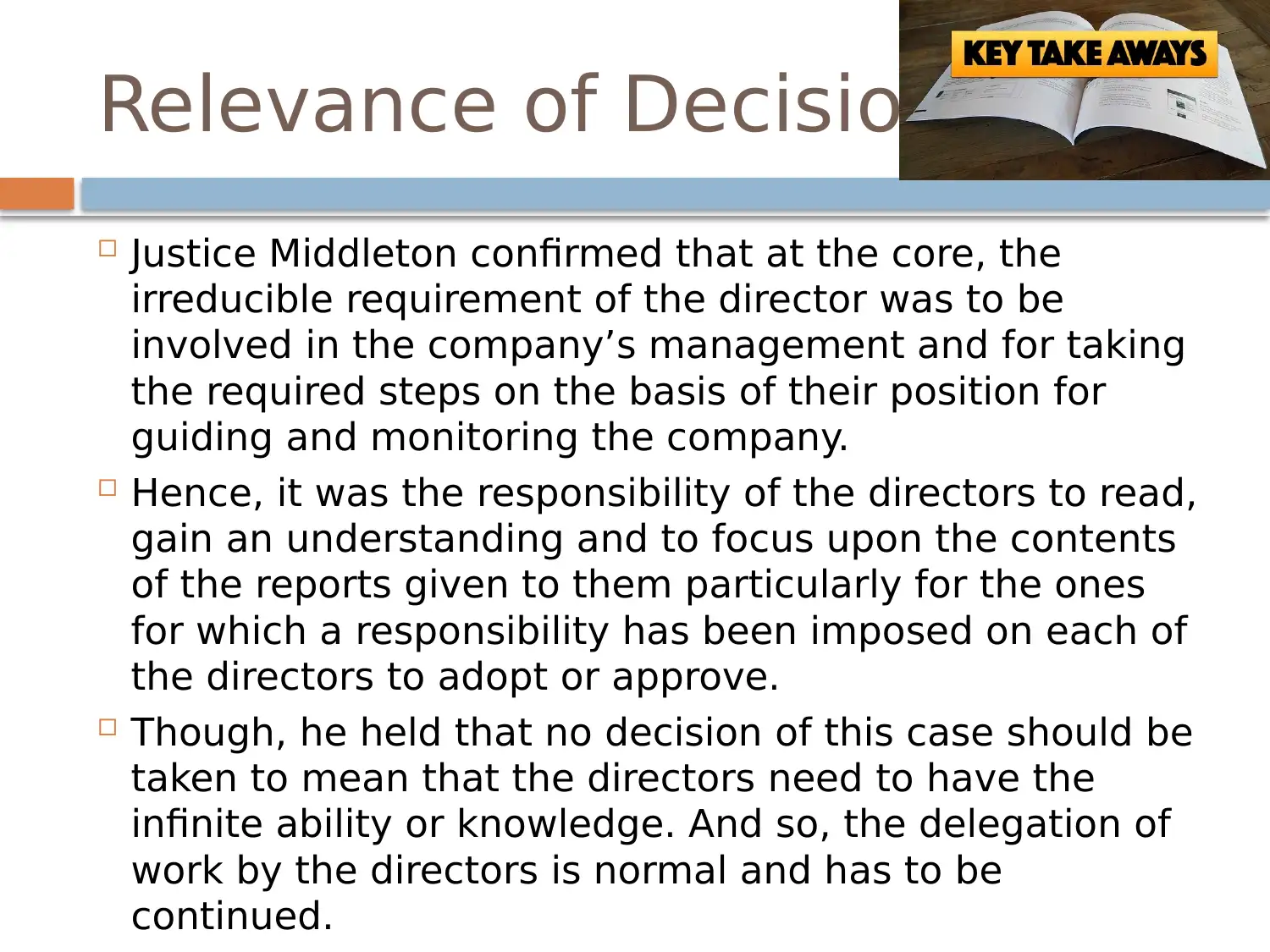
Relevance of Decision
Justice Middleton confirmed that at the core, the
irreducible requirement of the director was to be
involved in the company’s management and for taking
the required steps on the basis of their position for
guiding and monitoring the company.
Hence, it was the responsibility of the directors to read,
gain an understanding and to focus upon the contents
of the reports given to them particularly for the ones
for which a responsibility has been imposed on each of
the directors to adopt or approve.
Though, he held that no decision of this case should be
taken to mean that the directors need to have the
infinite ability or knowledge. And so, the delegation of
work by the directors is normal and has to be
continued.
Justice Middleton confirmed that at the core, the
irreducible requirement of the director was to be
involved in the company’s management and for taking
the required steps on the basis of their position for
guiding and monitoring the company.
Hence, it was the responsibility of the directors to read,
gain an understanding and to focus upon the contents
of the reports given to them particularly for the ones
for which a responsibility has been imposed on each of
the directors to adopt or approve.
Though, he held that no decision of this case should be
taken to mean that the directors need to have the
infinite ability or knowledge. And so, the delegation of
work by the directors is normal and has to be
continued.
Paraphrase This Document
Need a fresh take? Get an instant paraphrase of this document with our AI Paraphraser
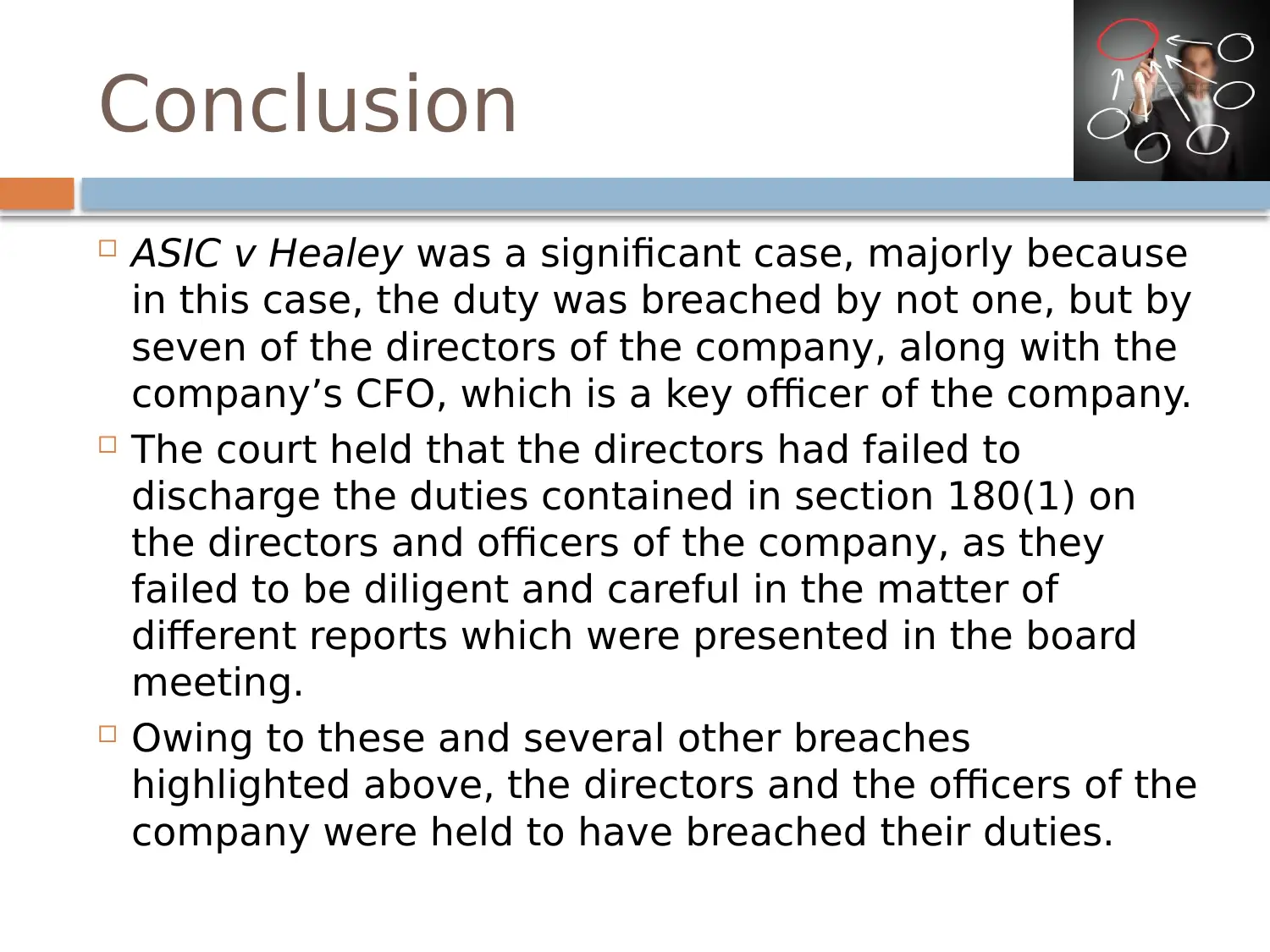
Conclusion
ASIC v Healey was a significant case, majorly because
in this case, the duty was breached by not one, but by
seven of the directors of the company, along with the
company’s CFO, which is a key officer of the company.
The court held that the directors had failed to
discharge the duties contained in section 180(1) on
the directors and officers of the company, as they
failed to be diligent and careful in the matter of
different reports which were presented in the board
meeting.
Owing to these and several other breaches
highlighted above, the directors and the officers of the
company were held to have breached their duties.
ASIC v Healey was a significant case, majorly because
in this case, the duty was breached by not one, but by
seven of the directors of the company, along with the
company’s CFO, which is a key officer of the company.
The court held that the directors had failed to
discharge the duties contained in section 180(1) on
the directors and officers of the company, as they
failed to be diligent and careful in the matter of
different reports which were presented in the board
meeting.
Owing to these and several other breaches
highlighted above, the directors and the officers of the
company were held to have breached their duties.
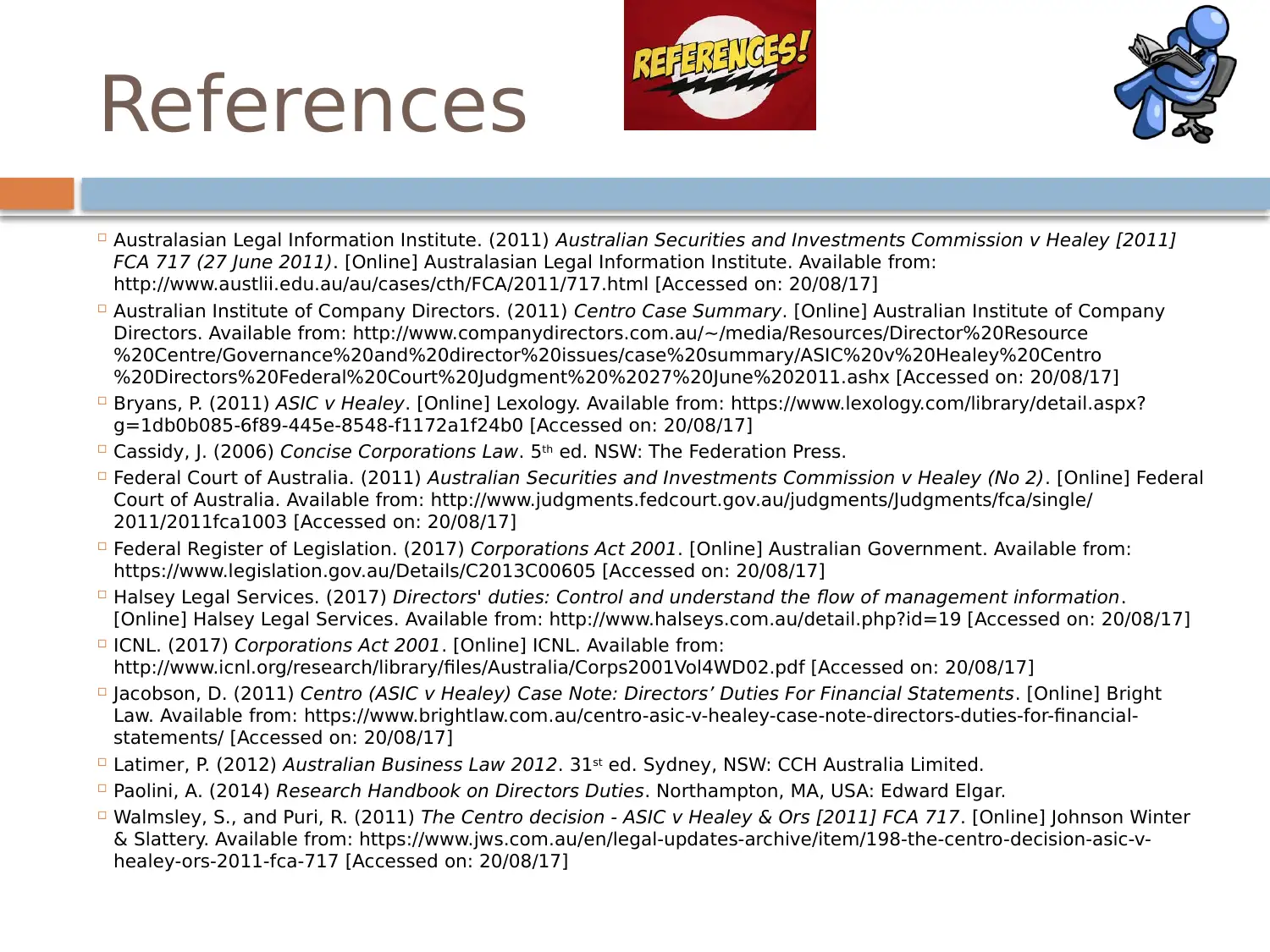
References
Australasian Legal Information Institute. (2011) Australian Securities and Investments Commission v Healey [2011]
FCA 717 (27 June 2011). [Online] Australasian Legal Information Institute. Available from:
http://www.austlii.edu.au/au/cases/cth/FCA/2011/717.html [Accessed on: 20/08/17]
Australian Institute of Company Directors. (2011) Centro Case Summary. [Online] Australian Institute of Company
Directors. Available from: http://www.companydirectors.com.au/~/media/Resources/Director%20Resource
%20Centre/Governance%20and%20director%20issues/case%20summary/ASIC%20v%20Healey%20Centro
%20Directors%20Federal%20Court%20Judgment%20%2027%20June%202011.ashx [Accessed on: 20/08/17]
Bryans, P. (2011) ASIC v Healey. [Online] Lexology. Available from: https://www.lexology.com/library/detail.aspx?
g=1db0b085-6f89-445e-8548-f1172a1f24b0 [Accessed on: 20/08/17]
Cassidy, J. (2006) Concise Corporations Law. 5th ed. NSW: The Federation Press.
Federal Court of Australia. (2011) Australian Securities and Investments Commission v Healey (No 2). [Online] Federal
Court of Australia. Available from: http://www.judgments.fedcourt.gov.au/judgments/Judgments/fca/single/
2011/2011fca1003 [Accessed on: 20/08/17]
Federal Register of Legislation. (2017) Corporations Act 2001. [Online] Australian Government. Available from:
https://www.legislation.gov.au/Details/C2013C00605 [Accessed on: 20/08/17]
Halsey Legal Services. (2017) Directors' duties: Control and understand the flow of management information.
[Online] Halsey Legal Services. Available from: http://www.halseys.com.au/detail.php?id=19 [Accessed on: 20/08/17]
ICNL. (2017) Corporations Act 2001. [Online] ICNL. Available from:
http://www.icnl.org/research/library/files/Australia/Corps2001Vol4WD02.pdf [Accessed on: 20/08/17]
Jacobson, D. (2011) Centro (ASIC v Healey) Case Note: Directors’ Duties For Financial Statements. [Online] Bright
Law. Available from: https://www.brightlaw.com.au/centro-asic-v-healey-case-note-directors-duties-for-financial-
statements/ [Accessed on: 20/08/17]
Latimer, P. (2012) Australian Business Law 2012. 31st ed. Sydney, NSW: CCH Australia Limited.
Paolini, A. (2014) Research Handbook on Directors Duties. Northampton, MA, USA: Edward Elgar.
Walmsley, S., and Puri, R. (2011) The Centro decision - ASIC v Healey & Ors [2011] FCA 717. [Online] Johnson Winter
& Slattery. Available from: https://www.jws.com.au/en/legal-updates-archive/item/198-the-centro-decision-asic-v-
healey-ors-2011-fca-717 [Accessed on: 20/08/17]
Australasian Legal Information Institute. (2011) Australian Securities and Investments Commission v Healey [2011]
FCA 717 (27 June 2011). [Online] Australasian Legal Information Institute. Available from:
http://www.austlii.edu.au/au/cases/cth/FCA/2011/717.html [Accessed on: 20/08/17]
Australian Institute of Company Directors. (2011) Centro Case Summary. [Online] Australian Institute of Company
Directors. Available from: http://www.companydirectors.com.au/~/media/Resources/Director%20Resource
%20Centre/Governance%20and%20director%20issues/case%20summary/ASIC%20v%20Healey%20Centro
%20Directors%20Federal%20Court%20Judgment%20%2027%20June%202011.ashx [Accessed on: 20/08/17]
Bryans, P. (2011) ASIC v Healey. [Online] Lexology. Available from: https://www.lexology.com/library/detail.aspx?
g=1db0b085-6f89-445e-8548-f1172a1f24b0 [Accessed on: 20/08/17]
Cassidy, J. (2006) Concise Corporations Law. 5th ed. NSW: The Federation Press.
Federal Court of Australia. (2011) Australian Securities and Investments Commission v Healey (No 2). [Online] Federal
Court of Australia. Available from: http://www.judgments.fedcourt.gov.au/judgments/Judgments/fca/single/
2011/2011fca1003 [Accessed on: 20/08/17]
Federal Register of Legislation. (2017) Corporations Act 2001. [Online] Australian Government. Available from:
https://www.legislation.gov.au/Details/C2013C00605 [Accessed on: 20/08/17]
Halsey Legal Services. (2017) Directors' duties: Control and understand the flow of management information.
[Online] Halsey Legal Services. Available from: http://www.halseys.com.au/detail.php?id=19 [Accessed on: 20/08/17]
ICNL. (2017) Corporations Act 2001. [Online] ICNL. Available from:
http://www.icnl.org/research/library/files/Australia/Corps2001Vol4WD02.pdf [Accessed on: 20/08/17]
Jacobson, D. (2011) Centro (ASIC v Healey) Case Note: Directors’ Duties For Financial Statements. [Online] Bright
Law. Available from: https://www.brightlaw.com.au/centro-asic-v-healey-case-note-directors-duties-for-financial-
statements/ [Accessed on: 20/08/17]
Latimer, P. (2012) Australian Business Law 2012. 31st ed. Sydney, NSW: CCH Australia Limited.
Paolini, A. (2014) Research Handbook on Directors Duties. Northampton, MA, USA: Edward Elgar.
Walmsley, S., and Puri, R. (2011) The Centro decision - ASIC v Healey & Ors [2011] FCA 717. [Online] Johnson Winter
& Slattery. Available from: https://www.jws.com.au/en/legal-updates-archive/item/198-the-centro-decision-asic-v-
healey-ors-2011-fca-717 [Accessed on: 20/08/17]
⊘ This is a preview!⊘
Do you want full access?
Subscribe today to unlock all pages.

Trusted by 1+ million students worldwide
1 out of 12
Related Documents
Your All-in-One AI-Powered Toolkit for Academic Success.
+13062052269
info@desklib.com
Available 24*7 on WhatsApp / Email
![[object Object]](/_next/static/media/star-bottom.7253800d.svg)
Unlock your academic potential
Copyright © 2020–2026 A2Z Services. All Rights Reserved. Developed and managed by ZUCOL.



![ASIC v Healey [2011] FCA 717: A Case Study on Director's Duties](/_next/image/?url=https%3A%2F%2Fdesklib.com%2Fmedia%2Fimages%2Ffk%2F3d1ef86084bc494bb7904e1405d0c700.jpg&w=256&q=75)

